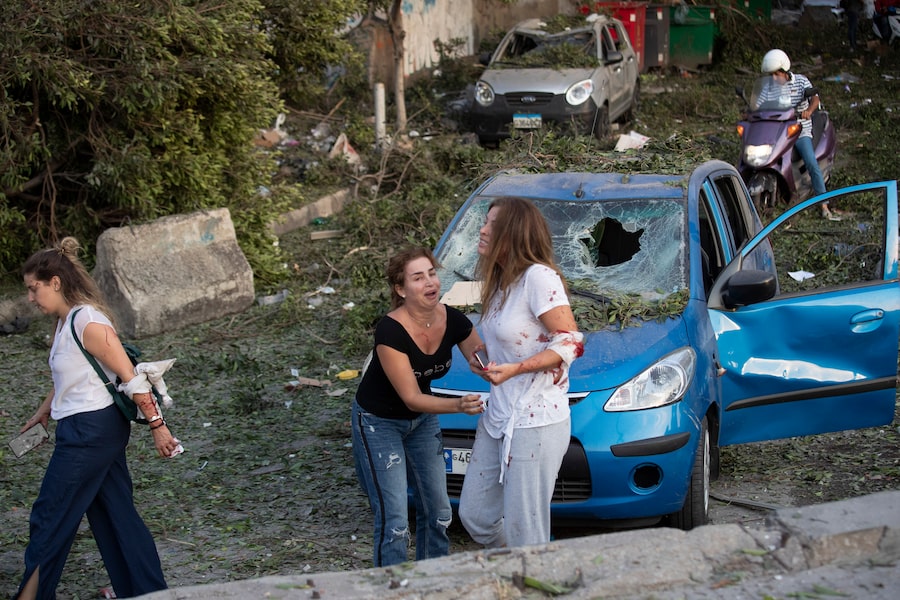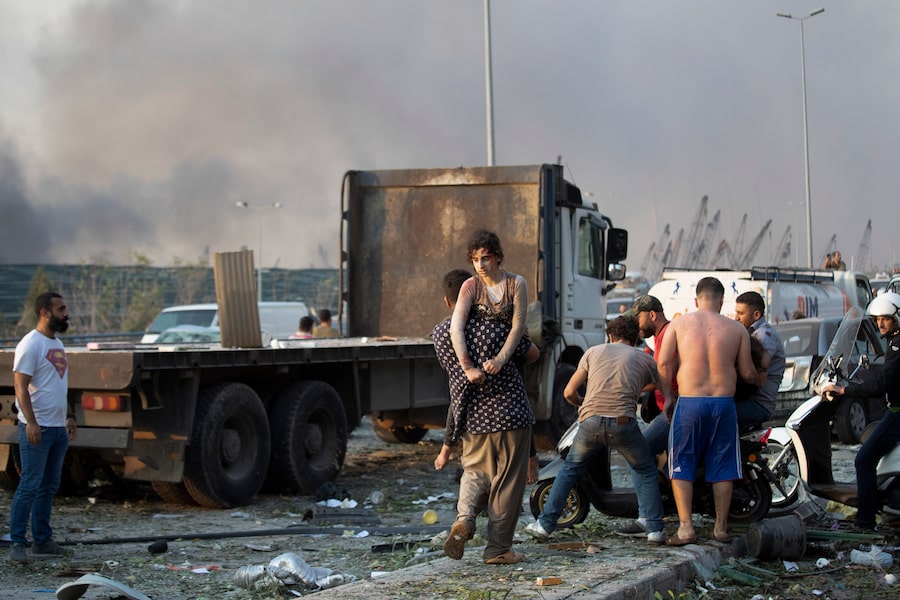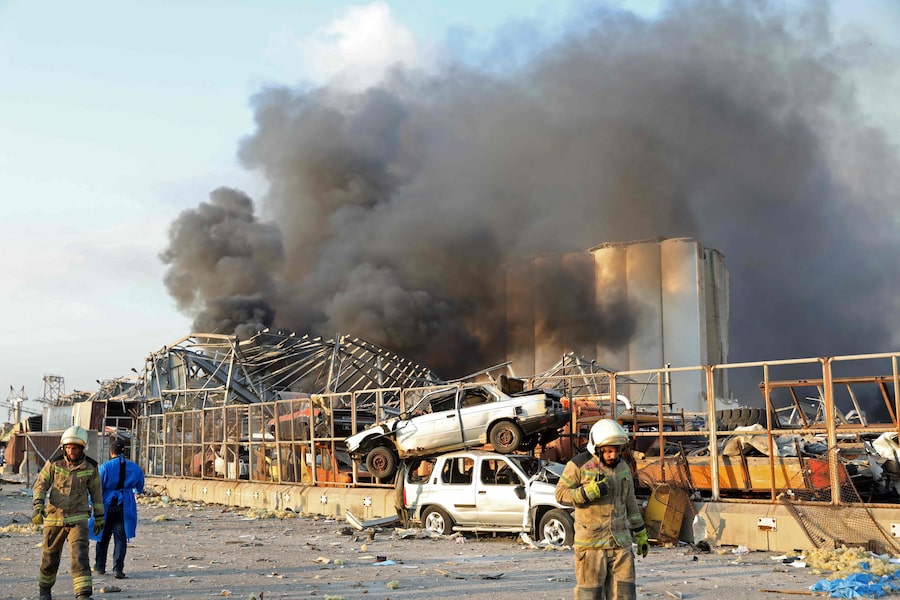A man is evacuated at the site of an explosion in Beirut, Lebanon on Aug. 4, 2020.MOHAMED AZAKIR/Reuters
A massive explosion – which could be seen from neighbouring villages, and heard as far away as Cyprus – tore through the heart of Beirut on Tuesday, killing at least 100 people and injuring more than 3,700 others.
The blast, reported to have been caused by an accident, sent up an orange-tinged mushroom cloud that towered over the Lebanese capital, and emitted a shock wave that overturned cars and blew doors off hinges many kilometres away.
Beirut’s hospitals, already struggling to deal with shortages of equipment and electricity – as well as a resurgent coronavirus pandemic – were quickly overwhelmed. They appealed for donations of blood as triage centres were set up in parking lots and ambulances rushed to Beirut from hospitals around the country.
Ahead of a government cabinet meeting on Wednesday, Lebanon’s Supreme Defence Council recommended declaring a two-week state of emergency in the capital and handing over security responsibility to military authorities.
Lebanese Canadians suffer anxious wait for news after tragedy in Beirut
Lebanon’s Prime Minister Hassan Diab said after the blast that 2,750 tonnes of ammonium nitrate had been stored for six years at the city’s port without safety measures and said it was “unacceptable.”
Mohamad Khalifeh, a former Lebanese health minister, told the Al Jazeera television network that “The devastation is beyond any description.” A trained doctor, Dr. Khalifeh said he had been helping treat the wounded who arrived at the hospital near his home. “I’ve never seen something like that, except when I was training during the rough time of the Lebanese civil war.”
The death toll was expected to continue to rise as rescue workers dug through the rubble of the port area after dark on Tuesday, looking for survivors as helicopters dropped water onto a blaze that continued to burn. Several buildings in the area were destroyed, and the port – central to Lebanon’s import-reliant and already-teetering economy – looked from video images to have been made unusable by the blast.
Condolences and offers of help poured in from around the world, including from the rival powers – Iran, Saudi Arabia, France, the United States, and even neighbouring Israel, which is technically in a state of war with Lebanon. These countries have jousted for decades for influence over the deeply divided, multisectarian country of seven million people.
“The United States stands ready to assist Lebanon,” U.S. President Donald Trump said at a White House briefing. “We will be there to help. It looks like a terrible attack.”
When asked later about his characterization of the explosion, Mr. Trump said U.S. military officials think the blast seemed to be an attack, “a bomb of some kind.” Other world leaders have not suggested that the explosion was the result of a bomb or an attack.

TURKEY
DETAIL
IRAN
LIBYA
SAUDI
ARABIA
0
1,000
KM
Mediterranean
Sea
Beirut
LEBANON
SYRIA
Damascus
Area of explosion
Mediterranean Sea
Port of
Beirut
Beirut
Central
District
EMILE LAHOUD
BEIRUT
51
SAEB SALAM
0
1,000
Horsh
Beirut
METRES
THE GLOBE AND MAIL, SOURCE: TILEZEN;
OPENSTREETMAP CONTRIBUTORS

TURKEY
DETAIL
IRAN
LIBYA
SAUDI
ARABIA
0
1,000
KM
Mediterranean
Sea
Beirut
LEBANON
SYRIA
Damascus
Mediterranean Sea
Area of explosion
Port of
Beirut
Beirut
Central
District
KM
EMILE LAHOUD
BEIRUT
51
SAEB SALAM
0
1,000
Horsh
Beirut
METRES
THE GLOBE AND MAIL, SOURCE: TILEZEN;
OPENSTREETMAP CONTRIBUTORS

TURKEY
DETAIL
EGYPT
SAUDI
ARABIA
0
1,000
KM
Beirut
LEBANON
SYRIA
Mediterranean Sea
Damascus
Mediterranean Sea
Area of explosion
Port of
Beirut
Beirut
Central
District
EMILE LAHOUD
BEIRUT
51
SAEB SALAM
0
1,000
Horsh
Beirut
METRES
THE GLOBE AND MAIL, SOURCE: TILEZEN; OPENSTREETMAP CONTRIBUTORS
The U.S. embassy in Beirut is urging those in the area of the blast “to stay indoors and wear masks where available” because of reports of toxic gasses, CNN says.
Global Affairs Canada said Tuesday that it was closely monitoring the “tragic situation in Beirut.”
“Our hearts are with the victims and their families,” the department said in a statement. “To date, we have received one request for consular assistance. Due to the provisions of the Privacy Act, no further information can be disclosed.” Canadians in need of consular assistance, Global Affairs said, can contact the Canadian embassy to Lebanon or the department’s Emergency Watch and Response Centre.
Foreign Affairs Minister François-Philippe Champagne posted on Twitter that Canada stands “with the people of Lebanon and the diaspora during this difficult time,” adding that ”We are ready to assist however we can.”
According to Canada’s 2016 census, about 220,000 Canadians are of Lebanese origin. A spokesperson for Mr. Champagne said that the minister had spoken with Lebanon’s Foreign Affairs Minister on Tuesday.
Lebanon’s official National News Agency reported that the blast was caused by a fire at a warehouse that had been storing seized explosive material in the city’s port district. Another local media report suggested that the warehouse contained ammonium nitrate that had been in storage at the port since authorities seized an illegal shipment of the substance – which can be used in both agriculture and the making of explosives – six years ago.
Mr. Diab declared that Wednesday would be a day of mourning, and vowed that there would be an investigation into the causes of the disaster.
“I promise you that this catastrophe will not pass without accountability. … Those responsible will pay the price,” Mr. Diab said in a televised speech. “Facts about this dangerous warehouse that has been there since 2014 will be announced, and I will not preempt the investigations.”
Many Lebanese will struggle to accept that the blast was an accident. Several Beirut residents posted on social media that they saw a warplane – something the modest Lebanese air force doesn’t possess – in the sky shortly before the blast. Others will view the accident as further proof that their country is collapsing into chaos.
Israel, which regularly sends warplanes into Lebanese airspace, and which for decades has traded blows with Hezbollah, a heavily armed Iranian-backed militia based in the south of Lebanon, issued a statement saying it had nothing to do with the explosion. The Hezbollah-run al-Manar news website – usually quick to blame Israel for anything it can – stuck to the official version of an accidental explosion.
Lebanon was already on edge before the blast. The country has been battered for months by a political crisis that has seen protesters repeatedly flood the streets, calling for the resignation of the country’s government, which is supported by Hezbollah. An economic collapse has seen the country default on loan repayments, while its currency has plummeted to less than a fifth of its previous value. Food prices, including for some key staples, have shot up nearly 200 per cent.
The explosion also came three days before an international tribunal based in The Hague is set to deliver a politically charged verdict in the trial of four alleged Hezbollah members who are accused of carrying out the 2005 assassination of Rafik Hariri, a former prime minister. Mr. Hariri was killed by a truck bomb, in another massive blast that shook the centre of Beirut.
“The initial reaction was to link today’s explosion to what’s going to happen [on Friday]. Was it a pre-emptive attack?” said Johnny Kairouz, a dual Lebanese and Canadian citizen who planned to return to Beirut to be with his family, who saw their home extensively damaged by the blast.
“Can fireworks really do that?” Mr. Kairouz said, referring to the blocks of devastation – which initial reports suggested had been caused by an explosion at a fireworks depot. “Or was it a warehouse for weapons?”
Lina Hamdan, an activist involved in the anti-government protests, sent photos to The Globe and Mail showing how the windows of her apartment had been blown in by the blast, which she compared with a “mini nuclear bomb.” She said the reported cause – a warehouse of explosive material that was left unattended for years on end – was more proof of the how poorly Lebanon is governed.
“No state? No institutions? No social coverage? No security! No currency! No electricity … and no responsible staff,” Ms. Hamdan wrote in a series of WhatsApp messages. She vowed the protests calling for the resignation of the government – and the ouster of the entire ruling establishment – would resume in the wake of the disaster. She predicted “a total shutdown of the country until we change them all.”
Canadian Liberal MP Fayçal El-Khoury told The Globe on Tuesday he has spoken with family members in Lebanon, adding that the situation is “really terrible over there.”
Canada must urgently send humanitarian aid and respond to calls from Lebanon for help, he added.
“We urge our government to start sending humanitarian help,” Mr. El-Khoury said. “Canada is one of the leading countries in helping worldwide when there is some humanitarian need.”
Mr. El-Khoury said the situation in Lebanon was challenging economically prior to the disaster, adding that COVID-19 complicates the response to the situation.
“Everything is complicated,” he said. “My heart is broken.”
Conservative MP Ziad Aboultaif said in an interview that his family used to own a motel across the street from the site of the explosion in Beirut, where he grew up.
The situation on the ground is devastating, he said, adding that his thoughts and prayers are with the victims and their families.
“I call on the Canadian community and the Lebanese community to start to find some supports for the victims … and to support the efforts to save lives,” he said.
With reports from Tu Thanh Ha in Toronto and Reuters
Our Morning Update and Evening Update newsletters are written by Globe editors, giving you a concise summary of the day’s most important headlines. Sign up today.



















 Mark MacKinnon
Mark MacKinnon Kristy Kirkup
Kristy Kirkup